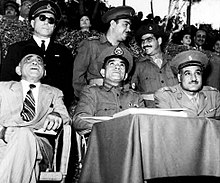
Gamal Abdel Nasser Hussein was an Egyptian military officer and politician who served as the second president of Egypt from 1954 until his death in 1970. Nasser led the Egyptian revolution of 1952 and introduced far-reaching land reforms the following year. Following a 1954 attempt on his life by a Muslim Brotherhood member, he cracked down on the organization, put President Mohamed Naguib under house arrest and assumed executive office. He was formally elected president in June 1956.

Egypt was a major battlefield in the North African campaign during the Second World War, being the location of the First and Second Battles of El Alamein. Legally an independent kingdom since 1922, and an equal sovereign power in the condominium of Anglo-Egyptian Sudan, in reality Egypt was heavily under the coercive influence of the United Kingdom, a state of affairs that had persisted since the United Kingdom intervened militarily in the Orabi Revolt in favour of Egypt's Khedive, Tawfik Pasha, in 1882, subsequently occupying the country.
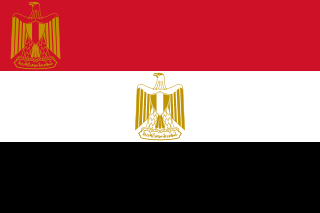
The President of the Arab Republic of Egypt is the executive head of state of Egypt and the de facto appointee of the official head of government under the Egyptian Constitution of 2014. Under the various iterations of the Constitution of Egypt following the Egyptian Revolution of 1952, the president is also the supreme commander of the Armed Forces, and head of the executive branch of the Egyptian government. The current president is Field Marshal Abdel Fattah el-Sisi, who has been in office since 8 June 2014.
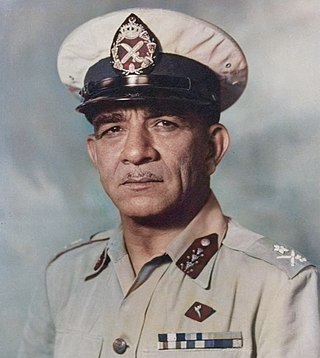
Mohamed Bey Naguib Youssef Qutb El-Qashlan, also known as Mohamed Naguib, was an Egyptian military officer and revolutionary, who along with Gamal Abdel Nasser, was one of the two principal leaders of the Free Officers movement of 1952 that toppled the monarchy of Egypt and the Sudan, leading to the establishment of the Republic of Egypt, and the independence of Sudan, and eventually South Sudan in 2010.

The Free Officers were a group of revolutionary Egyptian nationalist officers in the Egyptian Armed Forces and Sudanese Armed Forces that instigated the Egyptian revolution of 1952. Initially started as a small rebellion military cell under Abdel Moneim Abdel Raouf, which included Gamal Abdel Nasser, Hussein Hamouda, Khaled Mohieddin, Kamal el-Din Hussein, Salah Nasr, Abdel Hakim Amer, and Saad Tawfik, it operated as a clandestine movement of junior officers who were veterans of the Palestine War of 1948-1949 as well as earlier nationalist uprisings in Egypt in the 1940s. The nationally respected war hero Mohamed Naguib joined the Free Officers in 1949. Naguib's hero status, and influence within the army, granted the movement credibility, both within the military and the public at large. He became the official leader of the Free Officers during the turmoil leading up the revolution that toppled King Farouk in 1952. The Movement was succeeded by the Revolutionary Command Council after the overthrow of Farouk that was later succeeded by the Supreme Council of the Armed Forces

Mohamed Abdel Hakim Amer was an Egyptian military officer and politician. Amer served in the 1948 Arab–Israeli War, and played a leading role in the military coup that overthrew King Farouk in 1952. After leading Egyptian forces in the 1956 Suez war, he was appointed Minister for Defense by President Gamal Abdel Nasser and was Egyptian Vice President between 1958 and 1965.
The History of the Muslim Brotherhood in Egypt (1939–1954) discusses the History of the Muslim Brotherhood in Egypt from its actions during World War II to its official dissolution by the Egyptian government.
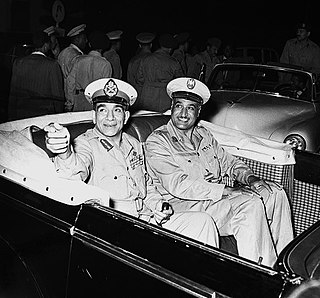
The Egyptian revolution of 1952, also known as the 1952 coup d'état and 23 July Revolution, was a period of profound political, economic, and societal change in Egypt. On 23 July 1952 the revolution began with the toppling of King Farouk in a coup d'état by the Free Officers Movement. This group of army officers was led by Mohamed Naguib and Gamal Abdel Nasser. The Revolution ushered in a wave of revolutionary politics in the Arab World, and contributed to the escalation of decolonisation, and the development of Third World solidarity during the Cold War.
The Revolutionary Command Council was the body established to supervise the Republic of Egypt and Anglo-Egyptian Sudan after the Revolution of 1952. It initially selected Ali Maher Pasha as Prime Minister, but forced him to resign after conflict over land reform. At that time, the Council took full control of Egypt. The RCC controlled the state until 1954, when the Council dissolved itself.

Zakaria Mohieddin was an Egyptian military officer, politician, Prime Minister of Egypt and head of the first Intelligence body in Egypt, the Egyptian General Intelligence Directorate.

The Kingdom of Egypt was the legal form of the Egyptian state during the latter period of the Muhammad Ali dynasty's reign, from the United Kingdom's recognition of Egyptian independence in 1922 until the abolition of the monarchy of Egypt and Sudan in 1953 following the Egyptian Revolution of 1952. Until the Anglo-Egyptian treaty of 1936, the Kingdom was only nominally independent, as the United Kingdom retained control of foreign relations, communications, the military, and Sudan. Officially, Sudan was governed as a condominium of the two states; however, in reality, true power in Sudan lay with the United Kingdom. Between 1936 and 1952, the United Kingdom continued to maintain its military presence, and its political advisers, at a reduced level.
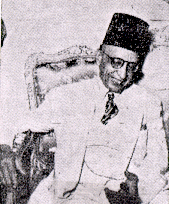
Ahmed Naguib el-Hilaly was an Egyptian lawyer and educator who served as Prime Minister of Egypt twice in 1952.

Gamal Salem was an Egyptian military officer and prominent member of the Egyptian Free Officers who led the Egyptian Revolution of 1952 that toppled the monarchy of Egypt and Sudan. Prior to the Revolution, he served as an officer in the Royal Egyptian Air Force.

Abdel Latif Boghdadi or Abd el-Latif el-Baghdadi was an Egyptian politician, senior air force officer, and judge. An original member of the Free Officers Movement which overthrew the monarchy in Egypt in the 1952 Revolution, Boghdadi later served as Gamal Abdel Nasser's vice president. The French author Jean Lacouture called Boghdadi "a robust manager" who only lacked "stature comparable to Nasser's." The two leaders had a falling out over Nasser's increasingly socialist and pro-USSR policies and Boghdadi subsequently withdrew from political life in 1964, although he mended ties with Nasser before the latter's death in 1970.
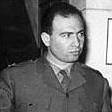
Khaled Mohieddine was an Egyptian military officer, revolutionary and politician. As a member of the Free Officers Movement, he participated in the toppling of King Farouk that began the Egyptian Revolution of 1952, and led to the establishment of the Republic of Egypt.

Salah Salem was an Egyptian military officer and politician who was a prominent member of the Free Officers Movement that orchestrated the Egyptian Revolution of 1952.
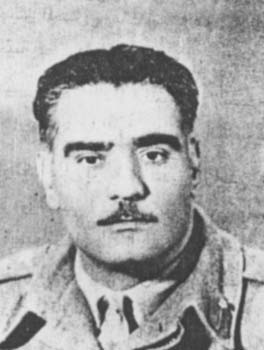
Youssef Seddik was an Egyptian military figure and politician. He is noted for his role in launching the first military procedures in the Egyptian Revolution of 1952.

Hesham Mohamed Qandil is an Egyptian engineer and civil servant who was Prime Minister of Egypt from 2012 to 2013. Qandil was appointed as Prime Minister by President Mohamed Morsi on 24 July 2012 and sworn in on 2 August 2012. Qandil previously served as Minister of Water Resources and Irrigation from 2011 to 2012.
The Declaration of the Republic was a constitutional declaration issued by the Revolutionary Command Council of Egypt on June 18, 1953. The purpose of this document was to begin Egypt's transition to a republic and to appoint Major General Muhammad Naguib as the republic's President.
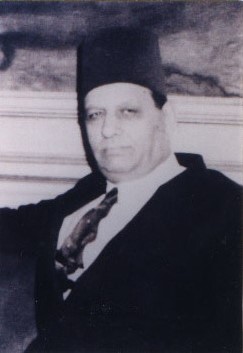
Mohamed Haidar Sayed El Heiny was an Egyptian military officer and politician. Haidar served in the 1948 Arab–Israeli War, and played a leading role in the Egyptian politics before the 1952 Revolution, especially in King Farouk's reign. He was appointed Minister for War by King Farouk. Haidar was also the president of Zamalek SC, he is the longest serving president in the history of the club.

